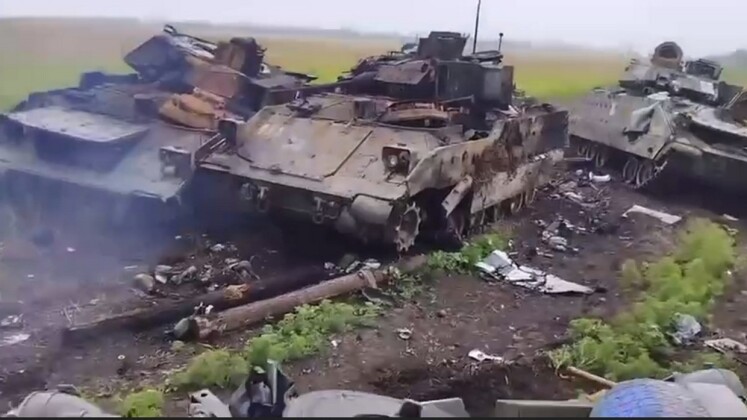News
Ukrainian Forces Take Major Losses in Donetsk, Kupyansk and Krasny Liman: Western Contractors Killed in Lvov
On July 21-22 in its second month of major offensives against Russian positions the Ukrainian Military reportedly took particularly significant losses on multiple fronts. In the Donetsk direction Russian Lieutenant General Igor Konashenkov reported on July 22 that while repelling 14 Ukrainian attacks, Russian forces eliminated over 280 Ukrainian servicemen in the past 24 hours as well as artillery systems and armoured vehicles. In the same period in the Kupyansk direction Ukrainian focus lost an estimated up to 110 servicemen, several days after Ukrainian sources had reported Russian advances in the area. In the the Krasny Liman direction seven Ukrainian attacks were repelled and up to 170 servicemen were killed, and the operations of a Ukrainian special reconnaissance group was reportedly also thwarted. The Russian Defence Ministry has estimated that Ukraine has taken approximately 26,000 casualties in its offensives which began in early June. Massive personnel losses are far from unprecedented, however, with Western sources widely reporting not only that Kiev is pressing barely trained conscripts into the frontlines, but also that the life expectancy on some fronts has been as low as four hours – most notably city of Bakhmut where the conditions for Ukrainian units was widely referred to as a ‘meat grinder.’

Russian officials revealed on July 22 that strikes carried out on July 6 against the Ukrainian armed forces academy in Lvov had targeted large concentration of foreign military contractors, the majority of them of Polish and German origin. “According to verified information, the July 6 group strike with long-range naval-based precision weapons at the Ukrainian armed forces’ ground forces academy in Lvov resulted in a large number of eliminated Polish and German mercenaries, who were accommodated there,” General Igor Konashenkov reported. On July 23 Russian President Vladimir Putin elaborated regarding the fates of foreign contractors in Ukraine: “As for the foreign mercenaries, they also suffer significant losses,” adding that this was “because of their stupidity” – agreeing with his Belarusian counterpart Alexander Lukashenko that tactics had been poor. The Defence Ministry warned that “Russia’s armed forces will continue the targeted destruction of foreign mercenaries on the territory of Ukraine.”

Foreign contractors particularly from Poland have played an increasingly central role in the Ukrainian-led war effort, with former senior advisor to the U.S. Secretary of Defence U.S. Army Colonel (ret.) Douglas McGregor accordingly reporting in February the presence of an estimated 20,000 contractors from Poland alone who played key roles in the war effort including in frontline positions such as Bakhmut. The head of the Russian Wagner Group paramilitary force Yevgeny Prigozhin who has overseen many of the operations in the area, reported in late April regarding the deployments of large numbers of Polish forces to Bakhmut: “Well-trained enemy units are now being tossed into Bakhmut. Polish speech all day long. While I used to say there were few mercenaries, now there’s a large number of them.” Ideologically motivated foreign volunteer units have also played important roles in the conflict, a notable example being the Polish Volunteer Corps which were involved in an assault on Russia’s Grayvoron District on May 22. Russian state media and government sources have consistently declined to distinguish between contractors and volunteer fighters from abroad, however, referring to both consistently as ‘mercenaries.’ Both kinds of units have often been prioritised for targeting, however, a notable example being Iskander ballistic missile strikes on the Georgian Legion in April.












